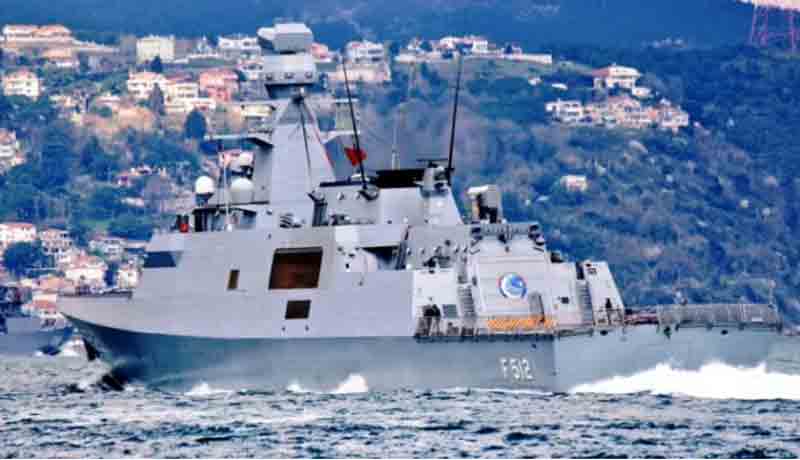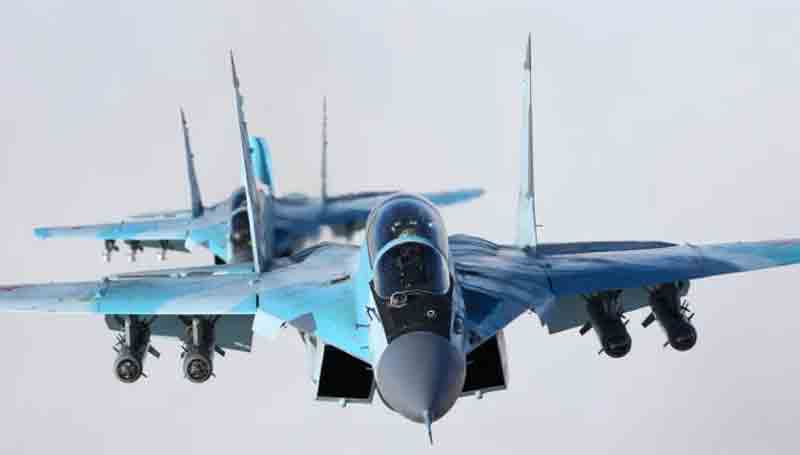As South Asia stands on the edge of potential conflict following the Pahalgam attack in Jammu and Kashmir that resulted in 26 fatalities, the upcoming visit of the Turkish Navy’s TCG Buyukada to Karachi from May 4 to 7 is anticipated to exacerbate an already tense geopolitical situation. The arrival of this Ada-class corvette, a modern and stealthy surface combatant designed for anti-submarine warfare and patrol operations, is perceived as a symbolic act of solidarity between Turkey and Pakistan, further strengthening a defense alliance that has been expanding in both scope and importance.
India, currently engaged in a critical security standoff with Pakistan, is likely to regard the presence of the Turkish warship with considerable suspicion, interpreting it as a subtle indication that Ankara may provide military support to Islamabad should tensions escalate along the Line of Control.
Admiral Zeki Akturk, the Public Relations and Media Advisor for the Turkish Ministry of National Defence, confirmed that TCG Buyukada is on its way to participate in the Langkawi International Maritime and Aerospace Exhibition (LIMA 2025), with planned port calls in Oman and Pakistan. “Alongside carrying out various missions and operations, the Turkish Armed Forces are continuously conducting training and exercises to improve their deterrence, operational readiness, and personnel skills,” the admiral stated, emphasizing Ankara’s ongoing regional engagement.
TCG Büyükada (F-512) is the second ship in the Ada-class of anti-submarine warfare corvettes operated by the Turkish Navy. The vessel is named after Büyükada Island, which is part of the Princes’ Islands archipelago situated in the Sea of Marmara, southeast of Istanbul.
It was designed, developed, and built by the Tuzla Naval Shipyard in Istanbul as a component of Türkiye’s indigenous MILGEM warship initiative. The Büyükada was laid down on January 22, 2008, launched on September 27, 2011, and officially entered service on September 27, 2013. The deployment of this Turkish warship follows closely after a contentious landing of a Turkish Air Force C-130E military transport aircraft in Karachi, which sparked a flurry of speculation on social media regarding a potential covert arms shipment to Pakistan amid escalating regional tensions.
Reports, referencing open-source flight tracking data and OSINT sources, indicated that the Hercules C-130E had traversed the Arabian Sea on April 28 before landing in Pakistan, with some sources suggesting it was carrying undisclosed military supplies. Heightening concerns, Indian media claimed that as many as six Turkish C-130E aircraft may have landed in Pakistan during the same period, causing significant alarm on the social media platform X, where Indian defense analysts, scholars, and geopolitical commentators questioned Ankara’s motives.
In response, Türkiye’s Presidential Directorate of Communications categorically rejected the claims, advising caution against speculative reporting that lacks official confirmation. “A Turkish cargo plane landed in Pakistan for refueling and then proceeded with its scheduled flight. Speculative news not originating from official authorities or institutions should not be taken seriously,” the statement emphasized, aiming to alleviate regional concerns.
Despite Ankara’s denial of any arms shipments, the strengthening defense relationship with Islamabad is clear. The collaboration includes advanced technologies in naval, aerospace, and unmanned systems, positioning Turkey as one of Pakistan’s key strategic defense allies. A notable project is Pakistan’s procurement of four MILGEM-class stealth corvettes, known locally as Babur-class warships, which is a $1.5 billion initiative and one of Turkey’s largest naval exports.
This program, developed under a technology transfer agreement between Turkey’s STM and Pakistan’s Karachi Shipyard & Engineering Works (KS&EW), involves the construction of two ships in Istanbul and two in Karachi, enhancing local shipbuilding capabilities and increasing Pakistan’s naval strength. Additionally, both nations are collaborating on the fifth-generation TAI TF Kaan stealth fighter program, with Ankara suggesting the establishment of a domestic production line in Pakistan to further integrate their defense industries.
The Pakistan Air Force (PAF) has also incorporated Turkey’s Bayraktar TB2 unmanned combat aerial vehicles (UCAVs), which have proven effective in various conflicts, demonstrating their real-time ISR and precision-strike capabilities. Satellite images from April 2022 confirmed the presence of Bayraktar TB2s at PAF Murid Air Base, where several drones were observed alongside ground control stations and logistical support, indicating the acquisition of at least two to six units. The operational deployment of the TB2 was further validated during PAF’s air defense exercises in September 2022, highlighting its complete integration into Pakistan’s command-and-control framework and its strategic importance in contemporary network-centric warfare.
The drones are equipped with domestically produced BARQ laser-guided missiles from Pakistan and MAM-L smart munitions supplied by Turkey, greatly enhancing their offensive capabilities against both stationary and moving targets in contested areas. Turkish media reports indicate that the integration of the Bayraktar TB2 into Pakistan’s air defense system highlights the platform’s growing effectiveness in intelligence, surveillance, reconnaissance (ISR), and precision strike operations, providing the Pakistan Air Force (PAF) with a significant edge in both asymmetric and conventional conflicts.
The defense partnership between Turkey and Pakistan transcends mere transactions; it is founded on shared religious ties, historical connections, and a common goal of strategic independence from Western-dominated military-industrial frameworks. Ankara’s unwavering support for Islamabad regarding the Kashmir issue—including its outspoken advocacy in international platforms such as the UN and OIC—has created tensions with New Delhi, which perceives Türkiye’s stance as a threat to its regional interests and sovereignty.
Recently, a high-ranking delegation led by Lieutenant General Yasar Kadioglu, Chief of Intelligence of the Turkish General Staff, met with Pakistan’s Air Chief Marshal Zaheer Ahmed Baber Sidhu during his visit to Air Headquarters in Islamabad. From India’s strategic viewpoint, the developing Turkey-Pakistan alliance—further strengthened by Ankara’s growing relationship with Beijing and its criticism of Indian domestic policies—poses an increasing multi-faceted threat to New Delhi’s security framework and regional dominance.
As South Asia evolves into a battleground for competing power dynamics involving NATO allies, China, and regional adversaries, the presence of Turkish warships in Pakistani ports and unmanned combat aerial vehicles (UCAVs) at its airbases indicates a shift in Islamabad’s strategic dependencies and highlights Ankara’s expanding defense influence beyond the Mediterranean.
Discover more from Defence Talks | Defense News Hub, Military Updates, Security Insights
Subscribe to get the latest posts sent to your email.





